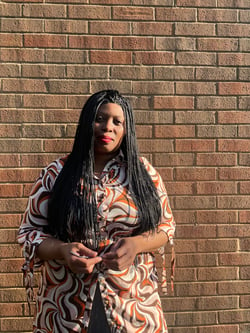Yvonne Battle-Felton is widely celebrated for her powerful storytelling, which delves into the complexities of human connections, untold histories, and the narratives that shape our lives. Her writing impacts diverse audiences, as it thoughtfully navigates through significant themes such as identity, history, and family, offering readers an immersive experience that resonates on multiple levels and encourages reflection and connection.
We recently had the pleasure of speaking with Yvonne, where she shared insights into the inspiration behind her latest novel, Curdle Creek, discussed her literary influences, and offered valuable advice for aspiring writers, particularly in the horror genre. And don’t miss her answer to the fun question of which three guests she’d invite to her dream dinner table—you’ll want to join in, too!
What inspired you to write Curdle Creek? What do you hope readers take away from it? 
I read Shirley Jackson’s The Lottery years ago. The story was suitably creepy in ways that made me think about my own traditions and the world we lived in. After reading it, I wondered what it would be like if there was a similar system today. Then I watched the YouTube adaptation of it and was surprised that there were no people of color in it at all. Even though the short story didn’t mention anyone’s ethnicity, when it came to how whoever adapted it saw it, it wasn’t a place or a story for people of color. I wondered: what might it be like if there was a lottery in an all-Black town? That question stuck with me off and on. It wasn’t until years later that I would first begin to explore it. A few years ago I had the opportunity to write flash fiction based on a crime, I returned to The Lottery and questions, and started imagining answers. The town of Curdle Creek was born. Like the questions of what if and what would it be like, the town kept sort of haunting me. I wanted to write more about it. The pandemic and different responses to it (individual, local, regional, government, institutions, national, and international) brought all of those questions crashing back. There was no getting away from it. It was time to write Curdle Creek.
What, in your view, are the essential elements that give a story its chilling quality? Does the magic lie in the suspense, the unknown, the setting, or something entirely different?
In some ways I think the magic lies in exploring what characters are willing to do to get what they want. When characters do unspeakable things to one another, but the rationale is clear, it tests what we think we know about people and how safe characters are at any given moment with one another. Maybe it’s also not so much the unknown as the known. The absolute logic of understanding what it might mean to be one choice away from a bad decision can be deliciously unsettling.
Are there any authors or specific works that have shaped your approach to writing narratives with a darker or more suspenseful tone? What aspects of these works captivated you?
There were lots! Anne Rice, Tananarive Due, Edgar Allan Poe, Toni Morrison, and Zora Neale Hurston influenced me in many ways. They all write quite differently. One might focus on vivid and lush descriptions that feel so real that I’ve found myself holding my breath. Another writes sparingly, allowing my imagination to fill in the crevices and seemingly place me on the sidelines of a scene. One thing I’ve gotten from all of them is a fascination with creating complex characters capable of hurting the people they love. I’m captivated by silences and character secrets. There’s something about characters straddling every day lives with their wants, secrets, and intimacies that makes me curious. When I’m curious, I ask questions and imagine. Then, I’m hooked.
How do you think cultural tales and folklore feed into modern narratives with eerie or ominous undertones? Is there a particular folk tale that you find especially haunting?
I live in a small town in West Yorkshire. Before I moved here, I hadn’t heard of it. It seems to sort of keep to itself. Like a few towns, it had a lush history that people here still reminisce about; a heyday with a bustling market that people came from miles around to experience. There were articles about it. Now, it’s quiet. I can see green, rolling hills out the back window. In the early morning, a cow or something bellows to other cows. Right now, children cheer as they play rugby. As the setting for a story, it seems (on the surface) like a pretty average sort of place. But, every Christmas they ring a bell, one year for each year since the birth of Christ. It’s called the Devil’s Knell. They ring it to save the soul of the person who killed a young boy in 1400 and something. To save his soul. Not to mourn or save the soul of the young boy. Every time I hear that story I wonder what would happen if they stopped ringing it, and of course, what would have to happen for them to stop. The story fascinates me as much as the silence around the story. When I say “every time I hear that story” I should mention that I only ever hear it when I bring it up. That’s when people talk to me about it. Otherwise, the bell rings and rings, and nobody seems to talk about why.
 For writers who are compelled to explore darker themes without resorting to clichés, what advice would you give to maintain originality and depth in their storytelling?
For writers who are compelled to explore darker themes without resorting to clichés, what advice would you give to maintain originality and depth in their storytelling?
Write what scares you. It doesn’t have to be the big questions or the sweeping events. Write about your everyday curiosities. I tend to try to write character first. I put them in different scenes with other characters and move the settings around to see what they want most to say (and who they want to say it to) and what they can’t say. I like to get an idea of their secrets. Once you know their secrets, you have an idea of their boundaries. From there, you can explore to see what they want to tell you and what they want to keep to themselves. When you run out of your own questions, I recommend reading the newspaper (or watching, listening to it). As you read, ask questions like: what really happened? What’s missing? What if, and what’s the worst that could happen? Each question can provide a layer to the story. Finally, consider the setting. What does it make possible? What can only happen there? What obstacles can the setting create? What might other characters have left behind there? Ideally, that curiosity will keep you coming to the page to write and the reader coming to the page to read it.
If you could have dinner with three people (alive or dead), who would they be and why?
I would love to have dinner with my grandmother again. I would also invite Toni Morrison and Rihanna. I think my grandmother would have loved her. My grandmother died nearly twenty years ago. I’d love to talk to her about life, hear her laugh again, and show her the life that her love made possible. Over dinner, I’d love to talk to Toni Morrison about writing, how she balanced the characters in her head with them on the page, and to just soak up some of her wit, humor, and joy. We would talk about serious things too but I wouldn’t want to waste too much time on that. She’s seen enough living. So now, I’d want her to have a good time getting to know my grandmother. Having Rhianna there would be the perfect dessert to the evening. I love how creative and entrepreneurial she is. I admire that she seems to be constantly in motion while also enjoying the moments. I would like to think it would be quite the inspirational evening filled with tears, joy, and laughter.
Images of Yvonne Battle-Felton by Marat Battle.
More from Yvonne Battle-Felton
Welcome to Curdle Creek, a place just dying to make you feel at home.
Osira, a forty-five-year-old widow, is an obedient follower of the strict conventions of the remote all-Black town that’s stuck in the past and governed by ominous rituals including a one in, one out population policy. Osira has always been considered blessed, but her luck changes when her grown children run off to parts unknown, escaping Curdle Creek’s harsh traditions, she comes in second to last in the Running of the Widows, and her father flees after his name is called in the annual Moving On ceremony.
Forced to jump into a well in a test of allegiance, Osira finds herself transported first back in time, and then into another realm where she must answer for crimes committed by Curdle Creek. Exile forces her to jump realms again, landing Osira even farther away from home, in rural England. Safe there as long as she sticks to the rules, she quickly learns there are consequences for every kindness. Each jump could lead Osira anywhere but will she ever find a place to call home? Curdle Creek is an American gothic in the tradition of Shirley Jackson that offers a mash-up of the surreal and literary horror that will appeal to fans of Ring Shout, The Salt Grows Heavy and Lovecraft Country. Yvonne Battle-Felton’s fever-dream of a tale is layered and eerie and quite unlike anything else.

